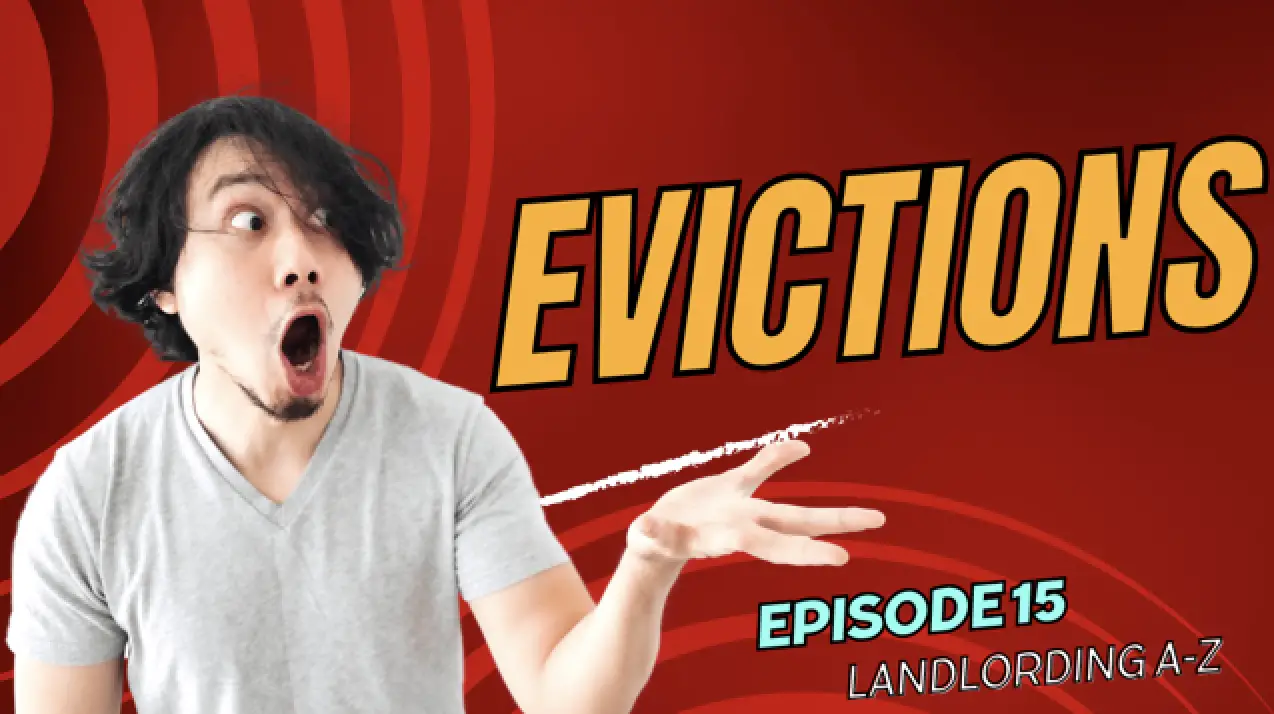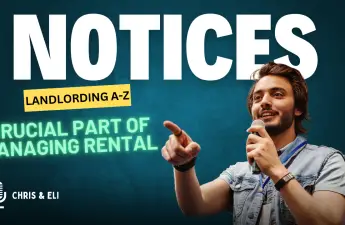The vast majority of tenants are reasonable and want to pay their rent and stay in good standing with their landlords, so most issues can be worked out amicably even when trouble does arise.
Unfortunately, however, there are still some times when a tenant cannot, or will not, meet the terms of their lease agreement. Non-payment is not the only serious problem landlords face, others can include damage to the property, dangerous conditions, or conflict with neighbors.
In these cases, forcing a tenant to leave through eviction can become a landlord’s last and only resort to fix a very broken situation.
In this episode, we’re going to talk about what eviction is, when it should be used, alternate solutions, and tips for executing one successfully. Below is a brief rundown. See the complete episode for more information.
What is an eviction?
An eviction is the court-ordered removal of a tenant. It is sometimes referred to as an “unlawful detainer” case. Common reasons for eviction include a tenant’s failure to pay rent, damage to a rental property, dangerous conditions or behavior, criminal activity, keeping unauthorized animals, or violation of some other term of the lease.
If they side with the landlord, a judge will issue a “writ of restitution/possession,” which is legal notice to the tenant that they must leave the property. If a tenant refuses to leave, a sheriff is dispatched to execute the writ, forcibly removing them from the property if necessary.
It’s important to remember that at any point, an eviction process can come to an end if a tenant fixes the problem or decides to vacate the property voluntarily.
The Eviction Process
Here is an overview of how an eviction process usually unfolds:
1. There’s a problem. Some term of the lease has been broken.
2. Notice: the landlord officially formally notifies the tenant that they are in violation of their lease and that they need to fix the problem (if possible). There are a few common notices:
- Notice to Pay or Vacate: Used when rent or other fees are not paid. 14 days is common, to remedy the situation or move out.
- Notice to Comply: Tenant has a period of time, 10 days being common, to fix a way in which they are in violation of the terms of the lease. Ex: Unauthorized pets, damage, smoking, etc.
- Notice to Quit: This is used where the problem is deemed “non-curable.” Often used where there is criminal activity, menacing or harassing behavior, or dangerous materials/conditions. Short duration, 3 days here in Seattle.
3. File an eviction lawsuit. File a complaint with the local court charged with eviction cases. There will be some fees, possibly up to a few hundred dollars.
4. Serve the Complaint & Summons on the tenant. This is the delivery of the court documents showing that the landlord is pursuing eviction. It communicates when a court hearing will be held, where the landlord will present their case for eviction to the court. A Complaint & Summons must be delivered to the tenant in person, or to another appropriate adult, at least 2 days before the hearing. It should not be delivered by the landlord, and it may be good to hire a professional service.
5. Wait for the tenant to reply to the complaint. In Washington, they have up to 30 days to reply.
6. A court hearing is scheduled.
7. If the landlord prevails, they receive a Writ of Restitution (or Possession).
8. If the tenant does not move out voluntarily, a Sheriff’s deputy may be dispatched to “execute” the writ, compelling a tenant to leave the property.
Information and Documentation Needed for Evictions
- Payment records, bank statements, invoices
- Communication between tenant and landlord
- Witnesses
- Photos/video
- Police reports
Best Practices: Avoid evictions, but also be ready
- Choose your tenants wisely! Screen your tenants carefully and check references.
- Enforce lease terms consistently and promptly. While it is sometimes a good idea to work with tenants who are having trouble complying with terms, don’t let it become a pattern, and be specific about what is expected if you do make some exceptions.
- Keep good communication records and make sure that all important information is shared in written form.
- Keep good payment records. This is a great reason NOT to take cash payments, as there is no paper trail. Even person-person payment apps may be too subjective. Property management software is a great way to keep clear records of a tenant’s payment history.
- Always go to the property with the Sheriff’s deputy when they execute the writ of restitution, returning the property to you.
- The Sheriff’s deputy may not compel the tenant to leave the property if an owner or manager is not there in person.
- Be prepared to move all belongings left behind to an appropriate storage facility that complies with local laws. The tenant’s belongings should not be left onsite.
- Be prepared to change the locks on the spot.
Things You Should Never Do
- Threaten tenants with any kind of retaliation
- Change locks
- Turn off utilities
These are sometimes called “self help” evictions, where landlords force out tenants. They are illegal and can carry heavy fines.
Alternatives to Eviction
- Coming to an agreement
- Cash for keys
- Payment plans, or plans to remedy lease violations.
Make sure these are clearly documented and agreed upon.
How Long Does an Eviction Take?
The length of an eviction depends on local laws and scheduling backlogs for courts and agencies. In general, it can take around one to three months if conducted efficiently.
This is around how long each step of the process can take:
- Notice to comply: A few days to a few weeks.
- File for Summons & Complaint and serve on tenants: A few weeks.
- Tenant reply window: Weeks to a month
- Court hearing and issuance of a judgment: Days to weeks
- Issuance of Writ of Restitution (if the judge sides with the landlord): Days to weeks.
- Move-out period set by court: A few days
- Sheriff executing Writ of Restitution: Days to weeks.
Hiring a Lawyer
Hiring a lawyer can give you the best chance of successfully evicting a tenant who has been a problem, in the shortest time possible.
They will know the laws in detail, which will help make sure you:
- Have grounds to evict.
- Put together a strong case.
- Manage the courts and agencies efficiently.
- Make sure you receive all compensation possible, potentially including coverage of legal fees and court costs, reimbursement for lost rent, or payment to repair any damage they left.
Takeaway
Avoid evictions at all costs. Make sure you screen your applicants carefully and pay attention to what’s going on at your property so problems don’t creep up on you. Make sure that you enforce lease terms consistently and issue notices promptly. Lastly, study up on local laws and eviction processes and even consider hiring a lawyer.

Landlording A-Z Series:
Our Landlording A-Z series will walk you through each of the stages, tasks, and issues involved in rental real estate investing. In our next installment, we’ll discuss the move-out process.
Disclosure: Some of the links in this post are affiliate links and Landlord Gurus may earn a commission. Our mission remains to provide valuable resources and information that helps landlords manage their rental properties efficiently and profitably. We link to these companies and their products because of their quality, not because of the commission.




